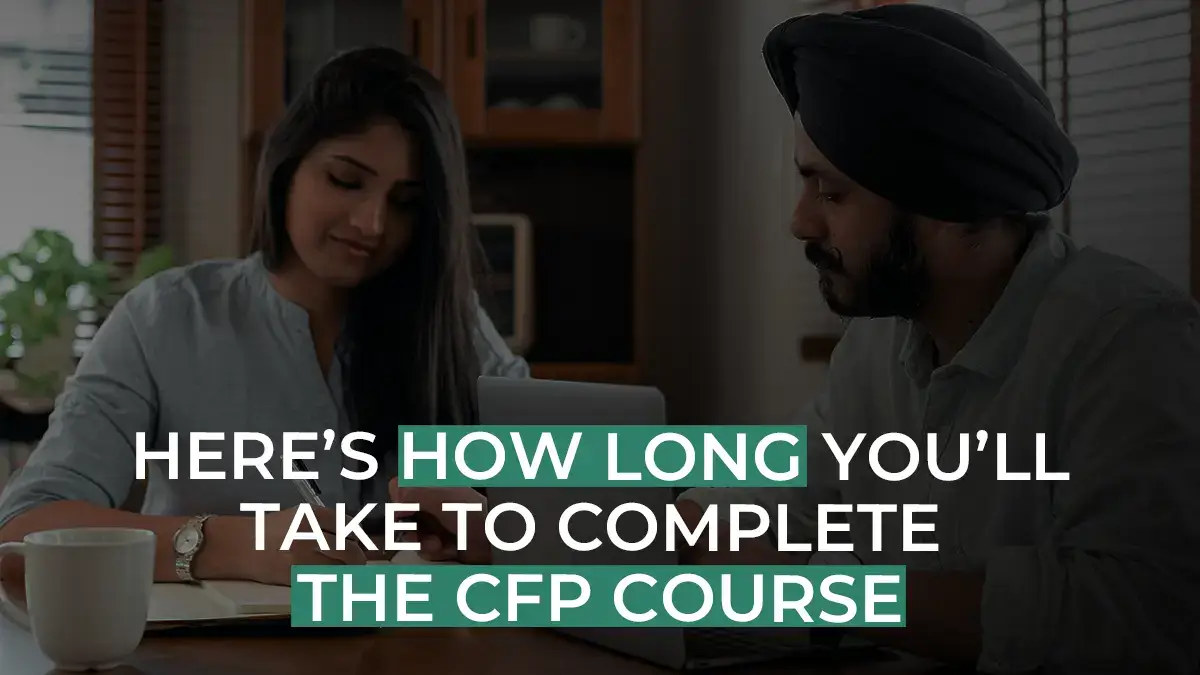Course Duration of Certified Financial Planning (CFP)

Here's What We've Covered!
The Certified Financial Planner (CFP) is a globally recognized certification for financial planning professionals. Becoming a CFP can significantly boost your credibility and open up various career opportunities; whether you are a fresh graduate or an experienced professional.
Eligibility for CFP
Based on the candidate’s education and experience level, the CFP program offers two pathways- Regular Pathways and the Fast Track Pathway. These pathways have individual specific eligibility criteria, which was designed to accommodate fresh graduates and experienced professionals- both.
-
Regular Pathway
The Regular Pathway is the best option for students and professionals who are just starting their careers in finance. To be eligible for this pathway, candidates must have completed their 12th-grade education or equivalent. This pathway is specifically designed to provide extensive knowledge and training in financial planning, covering all aspects of the CFP syllabus.
Eligibility for Regular Pathway
- Completion of 12th grade or equivalent.
- Enrolled in a CFP education program through an approved education provider.
-
Fast Track Pathway
This pathway is designed for professionals who already have a background in finance or fields that are related to it. This pathway helps experienced candidates to complete the CFP certification in a shorter period by leveraging their prior knowledge and experience.
Eligibility for Fast Track Pathway
- Postgraduate degree in Economics, Commerce, and Finance
- Minimum 3 years of work experience in financial planning, accounting or related discipline
- Enrolled in a CFP education program through an approved education provider.
Eligibility for Experienced and Self-Employed Professionals
The CFP Board provides additional flexibility for experienced and self-employed professionals. Before you enrol for the Fast Track Pathway and become eligible, you need to have good experience in financial planning or similar fields, allowing you to complete the certification more quickly.
Eligibility for Experienced and Self-Employed Professionals
- Minimum of three years of professional experience in financial planning or a related field.
- Demonstrated expertise in financial planning, wealth management, or investment advisory.
Looking for offline CFP Classes Near You? Get 200+ hrs offline CFP coaching, 2000+ Practice Questions & much more with Proschool
Course Duration of CFP
The duration of the CFP course varies on the type of pathway that you choose.
-
Regular Pathway Duration
The Regular Pathway is designed for candidates who don’t have any prior experience in financial planning, the course duration is longer than the Fast Track Pathway, which is 12 to 15 months. During the certification program, candidates undergo extensive training in financial planning that covers all modules that are needed for the CFP exam. For students and professionals who are looking to gain a thorough understanding of financial planning, this pathway is ideal.
-
Fast Track Pathway Duration
The Fast Track Pathway is designed for people with a background in finance or related fields. This method has a slightly shorter course duration, spanning from 6 to 7 months. This accelerated program allows applicants to use their current knowledge and expertise to finish the certification process sooner. This course is suitable for experienced professionals who want to improve their qualifications without committing to an extended study term.
Also Read – The Cost of Becoming a Certified Financial Planner (CFP) in India
CFP Syllabus
The syllabus for CFP is divided into four detailed modules, each covering an important area of financial planning. These modules are designed in a way that provides candidates with wide knowledge and crucial skills that are required to excel in the CFP exam in their careers.
Module 1: Integrated Financial Planning
Covers basics of financial planning, risk management and insurance planning.
Module 2: Investment Planning Specialist
Covers asset allocation, portfolio management and ways to mitigate risks and manage client’s portfolios.
Module 3: Risk & Estate Planning Specialist
Learn about tax planning strategies, estate planning and retirement planning. Help clients minimize tax liabilities and plan for their financial future.
Module 4: Retirement & Tax Planning Specialist
Learn about retirement planning and how to cater to long-term financial needs.
Also Read – An In-depth Overview of The CFP Syllabus in 2025
CFP Exam Format & Structure
The CFP aims to evaluate candidates’ knowledge and abilities in all four modules from the syllabus. The exam includes MCQs, case studies, and practical scenarios that measure candidates’ ability to apply their learning to real-world situations.
The CFP exam is divided into 3 parts:
- Part 1: Investment Planning
- Part 2 – Retirement & Tax Planning
- Part 3 – Risk & Estate Planning
Each part of the exam is structured to test candidates’ understanding of the key concepts and their ability to apply into practical situations. The exam is usually administered for 2 days, giving 2 hours to complete each part.
Also Read – What Jobs Can You Get In The UK as a Certified Financial Planner
FAQs
What’s the cost of CFP?
Costing for a CFP program depends on the agents, institute and the pathway that you choose. On average, the total cost of the CFP certification program- including course fees and exam fees; ranges from 60,000 rupees to 1,50,000 rupees.
How much does a CFP earn?
CFP professionals with entry-level salaries ranging from ₹4-6 lakhs per annum. With experience, CFPs can earn upwards of ₹10-12 lakhs per annum, depending on their role and location.
What Are job profiles in CFP?
CFP professionals have different job opportunities, including financial planners, wealth managers, investment advisors, and retirement planners. These job roles are available in financial institutions, wealth management firms, and even as independent consultants.
Resent Post
>
Best Study Abroad Courses for Commerce Graduates
>
Emerging commerce career options in India (2026): From CA to Data Analyst
>
ACCA Opportunities You Didn’t Know About – Think Beyond Audit!
>
Which Courses After 12th Commerce With High Salary Are in Demand Worldwide?
>
How to Find ACCA Jobs Online After Qualifying: Real Portals, Tips & Career Guidance
Follow Us For All Updates!



